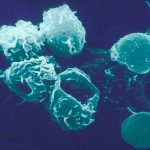Link to Pubmed [PMID] – 22623331
J. Immunol. 2012 Jul;189(1):61-71
γδ T (γδT) cells belong to a distinct T cell lineage that performs immune functions different from αβ T (αβT) cells. Previous studies established that Erk1/2 MAPKs are critical for positive selection of αβT cells. Additional evidence suggests that increased Erk1/2 activity promotes γδT cell generation. RasGRP1, a guanine nucleotide-releasing factor for Ras, plays an important role in positive selection of αβT cells by activating the Ras-Erk1/2 pathway. In this article, we demonstrate that RasGRP1 is critical for TCR-induced Erk1/2 activation in γδT cells, but it exerts different roles for γδT cell generation and activation. Deficiency of RasGRP1 does not obviously affect γδT cell numbers in the thymus, but it leads to increased γδT cells, particularly CD4(-)CD8(+) γδT cells, in the peripheral lymphoid organs. The virtually unhindered γδT cell development in the RasGRP1(-/-) thymus proved to be cell intrinsic, whereas the increase in CD8(+) γδT cells is caused by non-cell-intrinsic mechanisms. Our data provide genetic evidence that decreased Erk1/2 activation in the absence of RasGRP1 is compatible with γδT cell generation. Although RasGRP1 is dispensable for γδT cell generation, RasGRP1-deficient γδT cells are defective in proliferation following TCR stimulation. Additionally, RasGRP1-deficient γδT cells are impaired to produce IL-17 but not IFNγ. Together, these observations revealed that RasGRP1 plays differential roles for γδ and αβ T cell development but is critical for γδT cell proliferation and production of IL-17.

